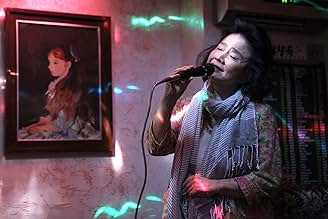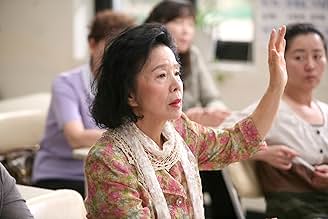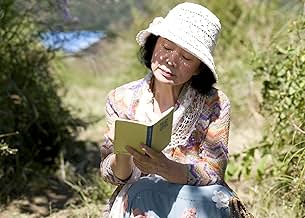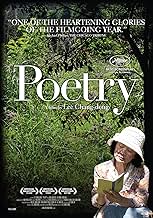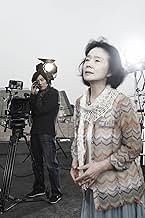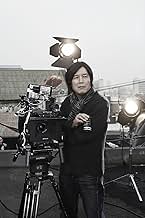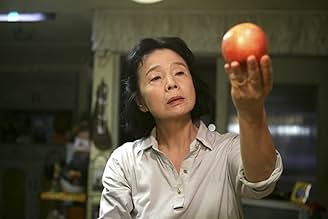IMDb RATING
7.8/10
14K
YOUR RATING
A sixty-something woman, faced with the discovery of a heinous family crime and in the early stages of Alzheimer's disease, finds strength and purpose when she enrolls in a poetry class.A sixty-something woman, faced with the discovery of a heinous family crime and in the early stages of Alzheimer's disease, finds strength and purpose when she enrolls in a poetry class.A sixty-something woman, faced with the discovery of a heinous family crime and in the early stages of Alzheimer's disease, finds strength and purpose when she enrolls in a poetry class.
- Awards
- 27 wins & 25 nominations total
- Director
- Writer
- All cast & crew
- Production, box office & more at IMDbPro
Featured reviews
Poetry (2010)
Steady and stealthy, this film proposes to be as lyrical and compact as a poem, but then it keeps going and ends up larger and more impressive than you'd expect. And the acting by leading female actress, the Korean star Jeong-hie Yun, is startling and nuanced, a great performance.
At the heart of the plot are two plots. The first is the title line—elderly Mija has decided to learn how to write poetry, so she attends a class (filled with younger students). The second is about a sex crime—a gang rape it turns out—by her grandson, who she is raising alone. The two are nearly opposites in so many ways we see how life itself balances the beautiful and ugly, and responsibility and indifference. In a larger way, "Poetry" is about contemporary life in Korea, and the interactions of ordinary people in extreme situations will be revealing to many outside of Korea.
It's hard to overstate how well this movie pulls off something socially serious and yet makes it all understated and almost matter of fact. There are these several lines of thought that keep going throughout, and that don't quite converge until the very end, which is both tragic (truly) and a bit mysterious. What exactly is the implication of that last scene on the bridge, and the water that shows nothing? It hearkens to the beginning, of course, but we have our main character at hand.
In that sense, it's a brilliant, almost perfect evocation of contemporary Korea on the most normal, middle class level. Lovely and loving, and cold and brutal. And it shows the glib sexism of the men there, much like everywhere at various times. And how to survive you sometimes have to just proceed. And then, of course, sometimes you do not survive.
Steady and stealthy, this film proposes to be as lyrical and compact as a poem, but then it keeps going and ends up larger and more impressive than you'd expect. And the acting by leading female actress, the Korean star Jeong-hie Yun, is startling and nuanced, a great performance.
At the heart of the plot are two plots. The first is the title line—elderly Mija has decided to learn how to write poetry, so she attends a class (filled with younger students). The second is about a sex crime—a gang rape it turns out—by her grandson, who she is raising alone. The two are nearly opposites in so many ways we see how life itself balances the beautiful and ugly, and responsibility and indifference. In a larger way, "Poetry" is about contemporary life in Korea, and the interactions of ordinary people in extreme situations will be revealing to many outside of Korea.
It's hard to overstate how well this movie pulls off something socially serious and yet makes it all understated and almost matter of fact. There are these several lines of thought that keep going throughout, and that don't quite converge until the very end, which is both tragic (truly) and a bit mysterious. What exactly is the implication of that last scene on the bridge, and the water that shows nothing? It hearkens to the beginning, of course, but we have our main character at hand.
In that sense, it's a brilliant, almost perfect evocation of contemporary Korea on the most normal, middle class level. Lovely and loving, and cold and brutal. And it shows the glib sexism of the men there, much like everywhere at various times. And how to survive you sometimes have to just proceed. And then, of course, sometimes you do not survive.
Reading Poetry's summary, one sees a sentimental film. I surely wasn't sure if I wanted to see this or not. I am completely happy I did.
What we have here is a slow-paced, delicate film. But it doesn't sway in sentimentality. It's subtle, quiet, and perhaps the most gentle film of the year, but it also wallows in the study of a suburban woman and in many ways feels like a dark portrait of a story. Yoon Jeong-hee is magnificent! She conveys so much emotion, and we realize just how quickly we want to see her journey here. The direction is assured, quitely letting us explore, never calling attention to itself. The screenplay is brilliant, and has the ideal arc needed for a film like this.
There are many amazing moments in this film, moments that really grabbed me and that emotionally shook me. One of the best films of the year in an already amazing year for film.
What we have here is a slow-paced, delicate film. But it doesn't sway in sentimentality. It's subtle, quiet, and perhaps the most gentle film of the year, but it also wallows in the study of a suburban woman and in many ways feels like a dark portrait of a story. Yoon Jeong-hee is magnificent! She conveys so much emotion, and we realize just how quickly we want to see her journey here. The direction is assured, quitely letting us explore, never calling attention to itself. The screenplay is brilliant, and has the ideal arc needed for a film like this.
There are many amazing moments in this film, moments that really grabbed me and that emotionally shook me. One of the best films of the year in an already amazing year for film.
POETRY (dir. Chang-dong Lee) POETRY is a slow-moving character drama which is disarmingly powerful, yet haunting and meditative. Mija is a sixty-six year old suffering from early onset Alzheimer's disease who lives in a rural Korean town with her indolent teen aged grandson, Jongwook. In an attempt to stimulate her cognitive abilities, she enrolls in a poetry class. Things are looking up until she learns that her grandson was involved in the suicide of one of his classmates. Jongwook and some of his friends had been sexually abusing a classmate, and this drove the young girl to take her life. Soon Mija is contacted by the fathers of the boys and learns that they want to pay the girl's mother a large sum of money to keep her from going to the authorities. In her poetry class at the community center Mija learns that in order to create poetry one must learn, 'to observe', 'to notice', and 'to witness'. The need for a heightened awareness or sensibility becomes the compelling dichotomy of the film. We observe that the fathers only focus on the ramifications of the incident on the lives of their sons, while Mija becomes moved and deeply empathizes with the loss of this innocent young girl to her family and the community. And, in the end Mija forces her grandson to face up to his responsibility, and she also constructs a loving and heartfelt poetic eulogy for the young girl. And, in a remarkable way of relating these two crucial events, the character of Mija is not even present as the actions unfold. Director, Chang-dong Lee, delivers a wonderful film which touches on a wide range of difficult subjects; poetry, dementia, sexual abuse and suicide, and casts an elderly semi-retired Korean actress as the star of the film. However, these kinds of mature topics and deliberate presentation are out of favor in Hollywood and unpopular with contemporary film audiences. I'm afraid that this film will never garner much commercial success, but if you take the time 'to witness', you will enjoy a truly rewarding cinematic experience.
What a wonderful film! To give my personal answer to one interviewer's question "Do you regard cinema, too, to be a dying form?" to the director Lee Chang-Dong. I believe (and deeply hope) that as long as films like Poetry are being made cinema will continue to flourish because it is important. It will continue to exist as long as humans exist because they are about being human. I was struck by how masterfully two sides of our humanness were presented in the film. On the one hand, it is about our search for beauty, as beauty can only be experienced if something of our own potential beauty responds to the beauty around us. There is something spiritual in this as Beauty and Truth are essentially one. On the other hand, there is the human predicament. That includes the pro and cons of the fact that we always have the choice to decide if we act ethically or not. That means if we actually say Yes to what is intrinsically our positive potential, or we say No and harm others, our environment and as a kind of end result, ourselves. What for me links the two is impermanence. Old age, illness and suicide as it is shown in the film. "Everything that is born will have to die" goes a very old Buddhist saying, and that happens no matter if we like it or not. At the same time, would we experience beauty if everything was to exist forever? Is it not because a beautiful flower grows out of a very simple looking seed in spring and then withers away after some weeks that it can become so precious to us? Without impermanence there is, one could say, by definition no beauty. Both are somehow the two sides of the same metaphorical coin. The same is true about this film. It still lingers on in my heart and mind weeks after I saw it. Very much like a true and wonderful poem, for example Rainer Maria Rilke's First Duino Elegy. It is is just about that, the wonder and horror of beauty.
Lee Chang Dong has always been a favorite Korean director of mine. His films, including "Poetry," have a subtle yet captivating force. "Poetry" is not for the average film viewer, but is for more mature audiences who are not afraid to confront life as it is and the existential aspects of life in general. The film is an exploration of complex human conditions that people can often find boring. But "Poetry" is inarguably meaningful and deep in its own way. It presents life realistically, but also paves way for finding positive little things within the worst conditions. "Poetry" is a film that will make you think in a way that almost no Hollywood movie can. Certainly, it is a powerful film as well. The only problem is that the majority of the population can misunderstand a film such as this one. It is a film that requires effort on the part of the audience to think and interpret the film for what it is. But once the purpose of the film is appreciated, it is a wonderful film for what it's worth. Go and watch it. It's a film that can change the way you look at everyday things.
Did you know
- TriviaThe idea for the film had its origin in a real-life case where a small town schoolgirl had been raped by a gang of teenage boys. When director Lee Chang-dong heard about the incident, it made an impact on him, although he hadn't been interested in basing a film on the actual events. Later, during a visit in Japan, Lee saw a television program in his hotel room. The program was edited entirely from relaxing shots of nature, "a peaceful river, birds flying, fishermen on the sea with soft new-age music in the background," and a vision for a possible feature film started to form. "Suddenly, it reminded me of that horrible incident, and the word 'poetry' and the image of a 60-year old woman came up in my mind."
- ConnectionsFeatured in At the Movies: Cannes Film Festival 2010 (2010)
- How long is Poetry?Powered by Alexa
Details
- Release date
- Countries of origin
- Official sites
- Language
- Also known as
- Thi Ca
- Filming locations
- Production companies
- See more company credits at IMDbPro
Box office
- Budget
- ₩1,300,000,000 (estimated)
- Gross US & Canada
- $356,149
- Opening weekend US & Canada
- $18,900
- Feb 13, 2011
- Gross worldwide
- $2,539,040
- Runtime2 hours 19 minutes
- Color
- Sound mix
- Aspect ratio
- 1.85 : 1
Contribute to this page
Suggest an edit or add missing content



